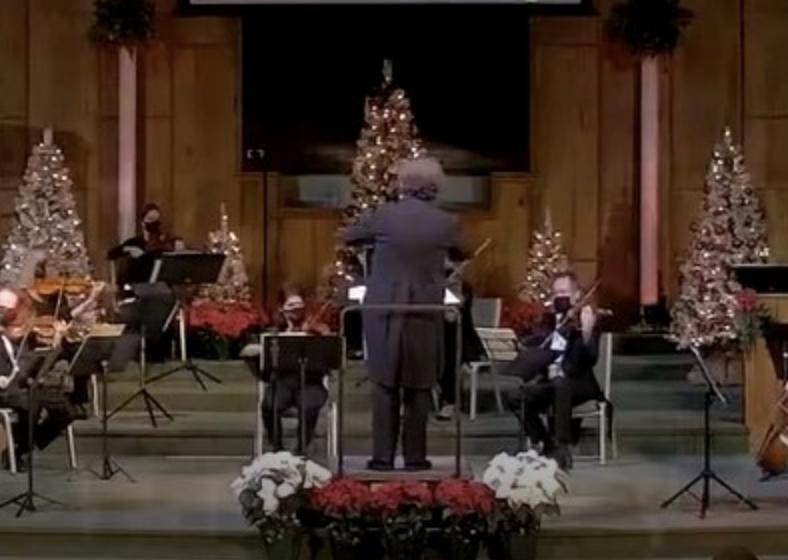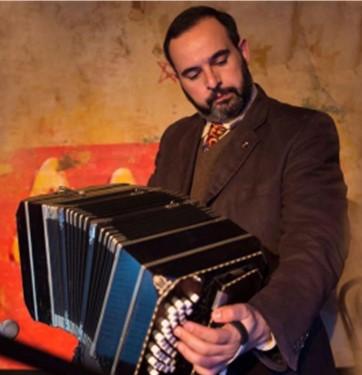Barring some new catastrophe in the meantime, the Mid-Atlantic Symphony Orchestra will complete its 2020-21 season of live and live-streamed concerts on Earth Day, April 22, without missing a beat–though its musicians undoubtedly broke a string or two.
Achieving a full season during the COViD-19 pandemic is more than the New York Philharmonic or almost any symphony orchestra from Baltimore to Berlin can claim. (That would be the Berlin Philharmonie of Germany. Maryland’s Berlin is well within the Mid-Atlantic Symphony’s regional orbit.)
The MSO hasn’t canceled a concert since April 5, 2020, one month after Maryland Gov. Larry Hogan declared a COVID state of emergency and just days after he issued a statewide stay-at-home directive. Still, the Eastern Shore and Southern Delaware’s only professional orchestra managed to perform last season’s belated finale by way of a free live stream on August 13. But the real work in getting the orchestra back on stage for this season began last March, even before the first COVID-19 death in Maryland on March 18.
“We had planned a glorious season for 2019-20,” MSO board president Jeffrey Parker recalled. “We would have had as many as 55 musicians playing as one. That’s how a symphony orchestra should sound. As one instrument. But we suddenly realized we couldn’t perform any of it. Not on that scale. So, we came up with the most unconventional season ever and put the whole thing together in three weeks” — just in time to announce a new slate of concerts for subscribers who otherwise might have thought there wouldn’t be a next season.
As he explained in a letter posted on the MSO website to both subscribers and those who purchase tickets to individual concerts, it would be “A Season of Strings.” The cast of musicians was limited to string players and percussionists. The decision was mandated by health considerations, though cost-cutting and social distancing also figured in. Woodwinds and brass instruments were eliminated because the spewing of breath droplets requires much more distance between musicians and the audience.
This remarkable “Season of Strings” concludes Thursday with the world premiere of Restored Images, written by James Lee III, an internationally acclaimed Baltimore-based composer. The piece was commissioned by the MSO, its first since 2009. The season finale also features soloist Rodolfo Zanetti, performing Astor Piazzolla’s Concerto for Bandoneon and Orchestra. (The bandoneon is an accordion-like instrument associated with the tango.)
“We shouldn’t be just a musical performing arts museum,” Parker said of the concert’s eclectic program. He spoke during a Zoom interview along with MSO Maestro Julien Benichou and general manager Dane Krich, who doubles as a percussionist.
“We should play more music by living musicians,” Benichou chimed in. “And other pieces you haven’t heard before, along with the standard repertoire from the four main classical periods: Baroque, Romantic, Classical, and 20th Century.”
Anticipating a future with, hopefully, the pandemic long behind us, Parker spoke with rhapsodizing enthusiasm about his No. 1 goal, which he shares with music director Benichou, to establish a Mid-Atlantic Symphony Youth Orchestra. “Outreach to young people has long been part of our DNA,” Parker said. He cited a recognition from the Yale School of Music for the orchestra’s efforts in introducing school kids to instrumental music–the 2016 Distinguished Educator Award to JoFran Falcon, then MSO’s vice president of education and outreach.
Benichou envisions creating virtual master classes for Delmarva schools using videos by individual MSO musicians demonstrating basic techniques on their instruments of choice. “Our goal is to have a youth orchestra performing with us by our 25th anniversary.” That’s the 2023-24 season.
Meanwhile, Parker and Benichou hope to further raise MSO’s profile through two other initiatives: Recruiting soloists to record with the orchestra, which as general manager Krich pointed out, would require contract negotiations with MSO’s regular ensemble of freelance musicians. Parker said he sees a day when the Mid-Atlantic might become unionized.
The second initiative is a summer pops concert series, which would provide more work for MSO musicians and a new stream of box office revenue. “We’re kind of inspired by the Proms concerts in London,” Parker said. The Avalon Foundation’s new performing arts tent might be a prospective venue along with outdoor sites in or around Ocean City.
But back to the not-yet-post-pandemic reality of “A Season of Strings:” “We were very fortunate to have a solid core of string players to pull it off,” Benichou said.
Aside from health considerations, there were artistic challenges, not the least of which were musicians hindered by playing while masked, unable to communicate or hear each other at a distance of six feet or more. Moreover, “most of our musicians, myself and our concertmaster included, had never performed this repertoire,” Benichou said.
It was a lucky break that the orchestra had played the Easton Church of God in previous seasons. Other MSO venues, including the Avalon Theater and the Ocean City Performing Arts Center, were off-limits by the governor’s order. An exception was made for houses of worship if they abided by seating restrictions. The Church of God is allowed up to 150 people in its sanctuary, which also serves as an acoustically pleasing concert hall. “God works in mysterious ways,” Parker observed.
Meanwhile, “our balance sheet is healthy,” Krich said. “We were able to pack all our preparation into just two rehearsals per concert.” One of the rehearsals was at the Church of God, where all concerts were performed this season, and the other in Baltimore, where many of the MSO’s freelance musicians are based.
“Our expenses are down with fewer musicians, and we saved on venues. Ticket sales are way down, of course, but our fundraising remains steady,” Parker said, adding, “We’re grateful to our loyal supporters for that.”
Looking ahead, Parker says, “There’s no turning back from live-stream. We’re reaching a wider audience–people who’d rather stay at home out of caution, even if they’re vaccinated. And subscribers who’d otherwise miss a concert because they went on vacation. If I had a crystal ball, I’d predict that 75 percent of our audience will return and 25 percent will live-stream.”
In the meantime, expect next season to be mostly strings early on, with winds and brass gradually phased in. “We hope by the end of next season to be where we had planned this season,” said Benichou. “We wanted to play the Porgy and Bess Suite (also known as Catfish Row) at this month’s finale. Maybe we can do it next spring. Also, Mussorgsky’s Pictures at an Exhibition, a very popular piece we’re never done before,” which was scheduled for last season’s COVID-canceled finale. “And since we missed Beethoven’s 250th birthday” – for the same reason –” we hope to do Saint-Saens’ 100th.”
A few masterpieces to look forward to in 2022.
Steve Parks is a retired New York arts writer and editor now living in Easton.
MID-ATLANTIC SYMPHONY ORCHESTRA SEASON FINALE
“Restored Images,” world premiere by James Lee III; Piazzolla’s Aconcagua Concerto for Bandoneon and Orchestra featuring soloist Rodolfo Zanetti, and Schoenberg’s Verklarte Nacht.
7:30 p.m. Thursday, April 22, Easton Church of God, 1009 N. Washington St. Limited seating, $45. Also available by live-stream through April 29, $15; 888-846-8600, midatlanticsymphony.org






Write a Letter to the Editor on this Article
We encourage readers to offer their point of view on this article by submitting the following form. Editing is sometimes necessary and is done at the discretion of the editorial staff.